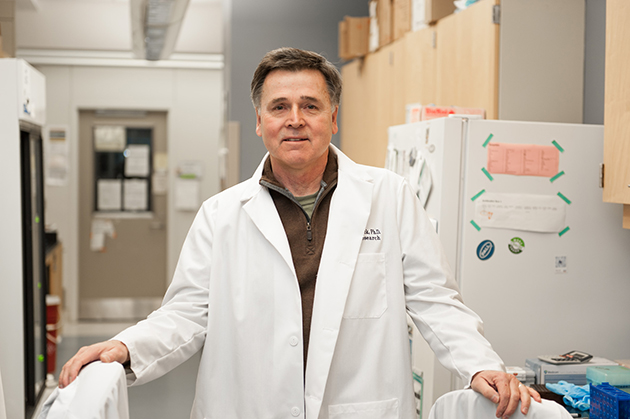

The Canadian Institutes of Health Research (CIHR) announced more than $8.6 million in research funding through their project grants program for 13 projects across Western University and Lawson Health Research Institute (Lawson).
Funded research projects range from the role of dynamic DNA methylation in gene regulation and cancer, to the surveillance of HIV outbreaks, and a randomized controlled trial for the Hockey Fans in Training Program.
Dr. James Koropatnick and his research team have been funded for a project that aims to improve cancer immunotherapy. Immunotherapy works by helping a patient’s own immune system recognize and kill cancer cells that make unusual molecules called neoantigens. However, some patients do not respond well to immunotherapeutic drugs. This is because their cancer cells reduce the number of neoantigens so that immune cells cannot recognize them.
Dr. Koropatnick and his team will work to make immunotherapy effective for more patients by forcing cancer cells to make more neoantigens. They discovered this can be done by damaging the cancer cells’ ability to repair their own DNA.

Above: Dr. James Koropatnick
The team is now making new molecules that target the exact steps in cancer cell DNA repair, including a specific kind called ‘DNA mismatch repair.’ These molecules will offer a potential new drug to combine with immunotherapeutic drugs already in use. The goal is to make immunotherapy work effectively in a majority of cancer patients.
“The concept of targeting cancer cell DNA repair and particularly DNA mismatch repair was co-developed by me and Dr. Saman Maleki, a very talented research associate in my laboratory,” says Dr. Koropatnick, a scientist at Lawson and professor in the Departments of Oncology, Microbiology and Immunology, Physiology and Pharmacology, and Pathology at Schulich School of Medicine & Dentistry, Western University. “With the assistance of cancer immunology experts Dr. Weiping Min and Dr. Xiufen Zheng, this funding will help our work towards new therapies that will make immunotherapy effective for a far greater number of patients. This includes patients with extremely dangerous and hard-to-treat tumours.”
Congratulations to all of the successful applicants: